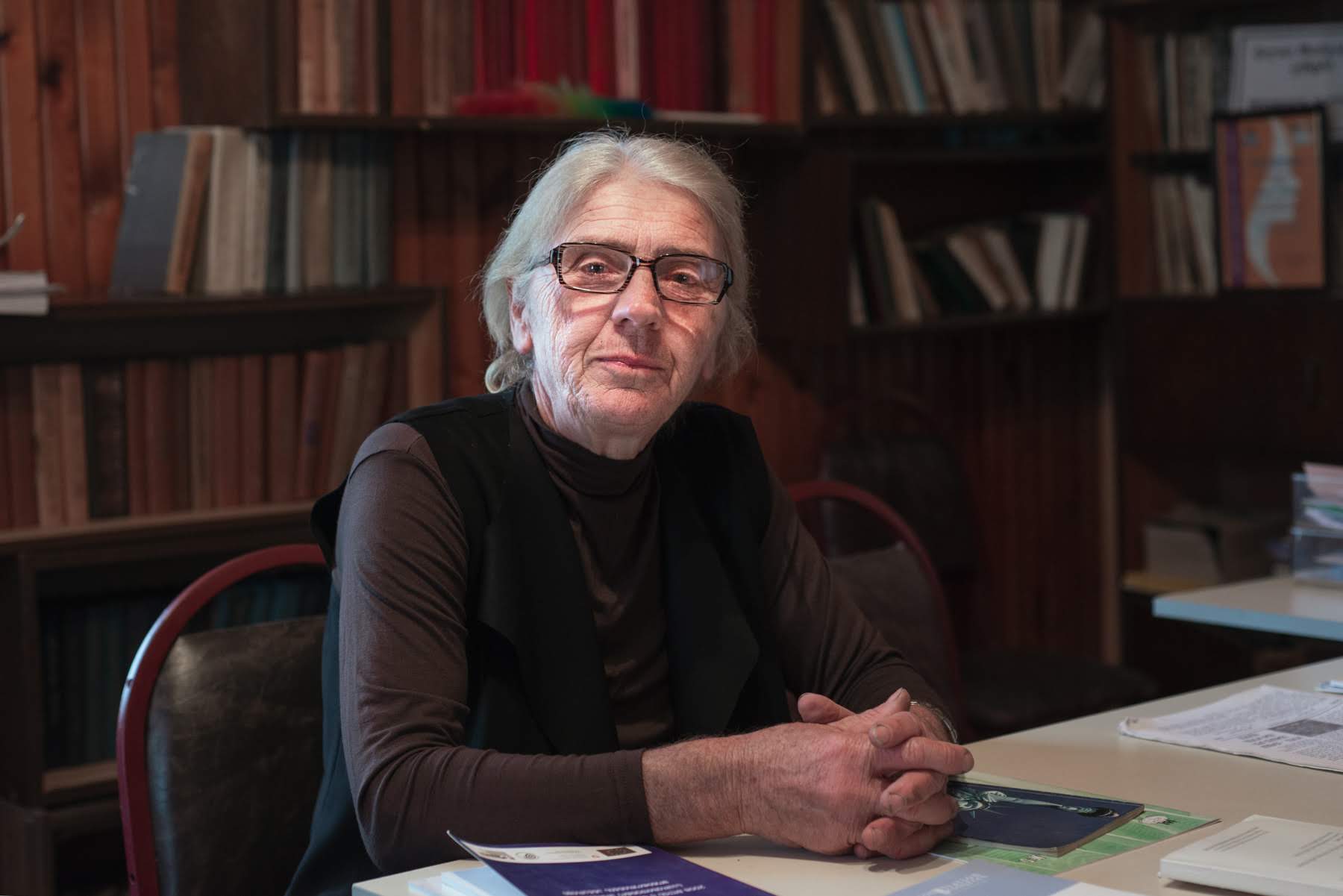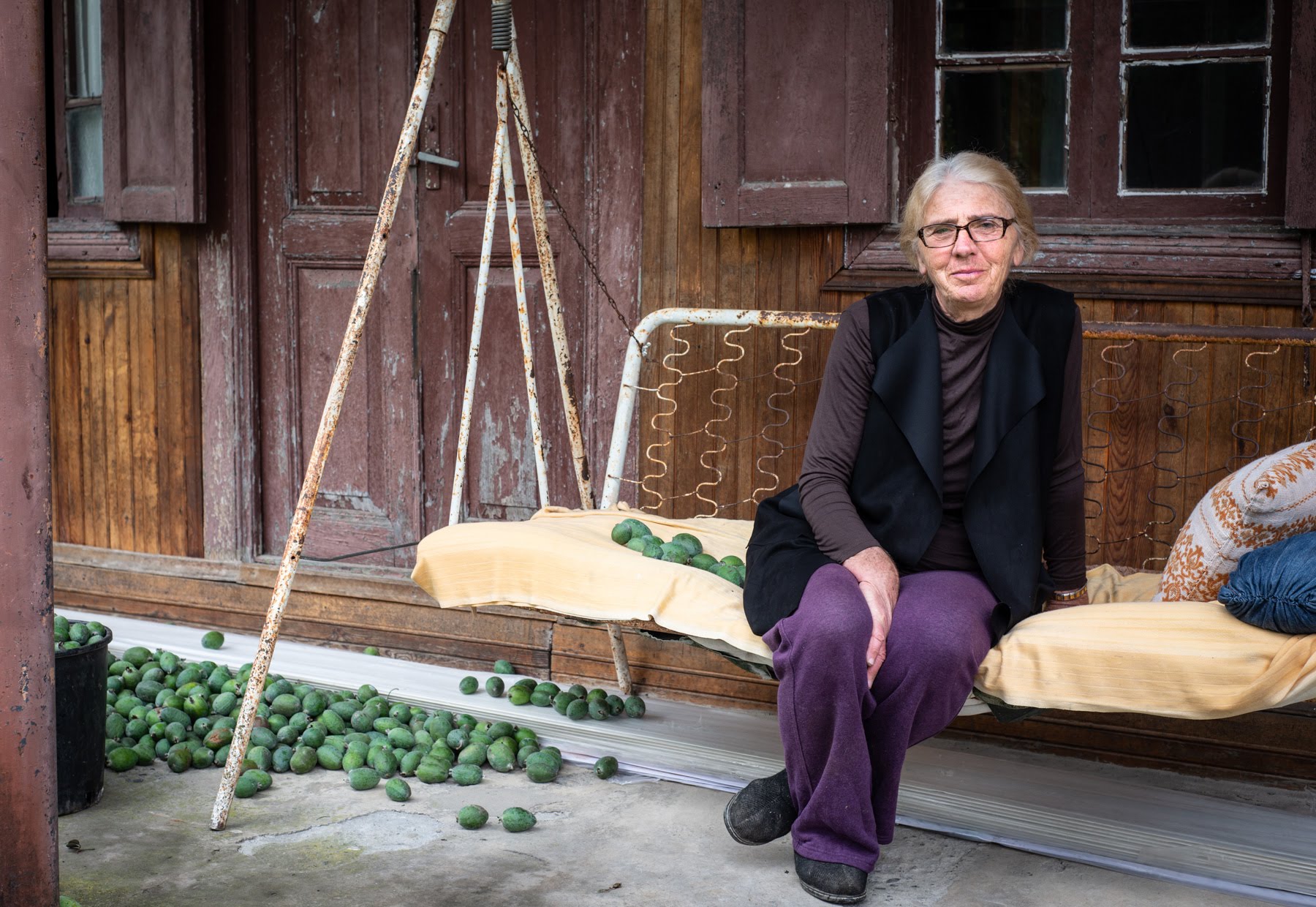

Nona Bukia, 67, lives in Khurcha, a village bordering Abkhazia on the western side of the River Enguri (Ingur). Bukia, who has headed the local branch of women’s rights group the Sukhumi Fund, believes domestic violence and an increase in other social problems is directly connected to the increased poverty triggered by Abkhazia’s closing down of crossing points three years ago.
‘Khurcha used to rely almost entirely on Abkhazia. I moved here in 1970 but I know that the villagers had close ties to Nabakevi [in Abkhazia] for years before that. I am from Kakhati [in western Georgia], but I […] settled in Khurcha with my family.’
‘In 1993–1994, when the [Sukhumi] Fund opened in our village, even many inhabitants of Zugdidi didn’t know that Khurcha was Georgian [controlled] territory.’
‘Before a bridge was built over the Enguri, we received all our services in Abkhazia — from schooling to education and healthcare. When the crossing points [between Georgian and Abkhazian controlled areas] were closed three years ago, suddenly we found ourselves in a deadlock.’
‘The villagers of Khurcha had struggled with unemployment for years before the closure, but at least the local women were able to cross the bridge to Abkhazia to trade and earn a little money. After the closure, women started to migrate abroad to work.’
‘We can only communicate with Nabakevi by phone now. They tell us that they’re suffering, that they feel isolated, but from our point of view, they have greater freedom of movement than we do. Every half hour, there are buses going to Gali, Chuburghinji, and Ochamchire. However, they have a different problem: they feel oppressed.’
‘It’s like somebody’s constantly pushing them around, threatening to kick them out of their land if they don’t pay their taxes. Their contact with Georgia is slowly fading. They only come to this side of the border to get their pensions.’
‘One can feel occupation everywhere. Not only are they occupied, but we are too. The occupation of Abkhazia is an occupation of our villages as well.’
‘Domestic violence is rooted in poverty’
‘I work on domestic violence in Khurcha and Koki [a nearby village]. When the crossing points were open, we used to help victims from Nabakevi as well. The very existence of this fund was salvation for them. A lawyer from there used to work with me.’
‘Domestic violence is rooted in poverty and is often followed by alcoholism. When I started working here, I was a local resident already, but still didn’t know many families. Now I know there are signs of domestic violence in most homes, but due to the mentality of villagers, the police have been called only once.’
‘This village is much too small to publicise such cases. I have had a case when a woman called me at night, and I had to be discreet when handling the situation. The abuser asked me what I was doing at their doorstep at such a late hour. I replied that the police had told me they’d heard a disturbing noise coming from that house, and that they had told me this knowing that I work on such issues. I didn’t want him to suspect that his wife had called me. Sometimes my work requires me to think creatively.’

‘Once domestic violence is discovered, we invite the abuser and the victim for consultations with psychologists and lawyers to rehabilitate them. The Sukhumi Fund also operates a shelter, though thankfully we’ve never needed to refer victims there. Since the fund started to operate, women know their rights.’
‘Those who have children generally move to [the regional capital] Zugdidi or Tbilisi. We have a great kindergarten, which was built for the children living in Abkhazia, to prevent their Russification. But now there are only 12–15 children there and the building is half-empty.’
‘We don’t have a school here. The nearest one is in Koki [4km away] and the children are driven to and from there every day. Previously, they used to go to school in Nabakevi, but the last student from this side [Georgian controlled territory] finished school last year.’
‘One of the things that we struggle with the most is the lack of proper transportation. We are in a very difficult situation: we are locked in. Only one bus serves our village. During the [presidential] elections we asked for an additional bus to be sent on Sundays. But once the elections ended, the head of the [local] transportation department was replaced and they canceled the extra bus – so we have to continue campaigning for it all over again.’
‘Hardships’
‘This is what Khurcha is like. Let’s say you want to go to work in Zugdidi, you need to spend a lot to commute. Without public transport you have to pay 11₾ ($3) for taxi, which doesn’t leave you with much left over for other things. Because of that men prefer to concentrate on their household and land, and women migrate. I estimate that women from 25 families have left, mostly to Greece, Italy, and Poland. There are only about 80–85 of us left here.’
‘We have many hardships in this village, and all that directly impact women. We don’t have a medical clinic. We’ve been asking for one for many years, but still nothing. Technically, Khurcha is a district of Koki. That’s where a pediatrician and a paramedic visit us from once a week. They stated in a [document outlining the scheme for developing the village] that they’d build a clinic, but funds weren’t enough. So, when they built the mall, we demanded a small room be allocated for a doctor. But they told us they were going to build a new clinic of modern standards. We are still waiting for it. We call the ambulance when we have to, but it often takes too long to arrive.’
‘Our village doesn’t have a lot of land. We don’t even have greenhouses to work at. One person won a tender for a greenhouse equipment three years ago, and that’s it. Generally, projects don’t come to fruition here and it’s hard to win a tender. NGOs used to come here when the crossing points were open, but mostly for gathering information, rather than to help local people. The government says our location is too volatile to fund projects and monitor them afterwards.’
‘Men don’t want to engage in a physical labour any more. Even if they did, there isn’t much work available. Once there are some projects in Anaklia [a deep-water port], they’ll probably go there. We had high hopes for this port. The government boasted we were going to be hired there, but it doesn’t seem to be panning out.’
‘You cannot move freely’
‘When the crossing points were functional, people from there had more contact with us. Many people can’t even afford to take Rukhi pass. Because of that, their connections with us weaken slowly. They might only come to take pensions, but they [the Abkhazian authorities] tend to hinder them in that as well. They demand that they show a Residence Permit. When they see that they have a Georgian passport, Abkhazia cancels their pensions not to let them take pensions both from here and there.’
‘There’s no crossing point other than at Rukhi. There are surveillance cameras every 100 metres, nobody can cross.’
‘In the villages like ours, you feel the occupation in everything. In Ganmukhuri, a school teacher has barbed wires crossing her yard. She has to inform authorities just to be able to go to school and teach.’
‘You cannot move freely, you have nowhere to work, you walk on a road, walk all day and get nowhere. You can feel this every step of the way, every village like ours, is extremely occupied.’
For ease of reading, we choose not to use qualifiers such as ‘de facto’, ‘unrecognised’, or ‘partially recognised’ when discussing institutions or political positions within Abkhazia, Nagorno-Karabakh, and South Ossetia. This does not imply a position on their status.










